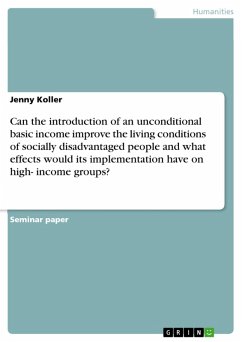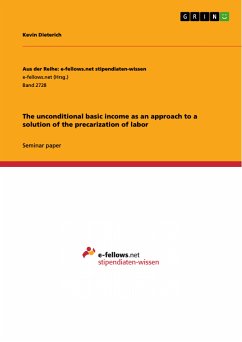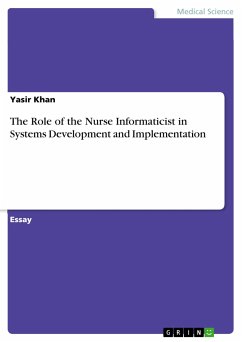Seminar paper from the year 2018 in the subject Social Studies (General), grade: 1,0, Budapest Business School, language: English, abstract: The idea of a fixed sum, which everyone should receive without compensation, is - depending on the interpretation - up to several hundred years old and has been considered by representatives of all political directions. But in recent years it has increasingly found supporters. There are good reasons for this. Work and economic life are changing at a pace that was hardly imaginable just a few decades ago. Automation, digitization and networking are the key words that mean in practice: The number of jobs that will increasingly be performed by smarter machines in the future is likely to rise. Where self-propelled trucks will take care of freight transport, where machines provide care services, the risk of losing their job will increase for thousands of people. This development is accompanied by growing dissatisfaction among those who are already out of touch with the labour market. The basic income is the response for a digitized working world and makes people free, say proponents. It sets false incentives, is too expensive and incalculable, say the opponents. Nonetheless, this topic is an approach which arises in order to provide a solution to these omnipresent concerns and in this paper, I will examine the effects of a basic income on high and low-income groups in order to see if a basic income would be realistic or just a solution for the short-run which is not applicable on all groups of the society. In this homework I will first define the unconditional basic income, determine its source and then go into attempts of implementation in order to deal in greater detail in the main part with the effects on the population groups that I have just mentioned. I will also use a survey to try to reflect and explain the current opinions of those who would be affected. In the end of this paper, I aim to be able to answer the question of whether unconditional income could become reality or whether it continues to be a utopia far away, by weighing the pros and cons, the knowledge I have gained and the evaluation of the survey. As it is difficult to look at the unconditional basic income in general, I will focus on the German situation and often explain examples from Germany in order to create a basis for constructive considerations and to give an understanding of how complex and controversial the subject can be.
Dieser Download kann aus rechtlichen Gründen nur mit Rechnungsadresse in A, B, BG, CY, CZ, D, DK, EW, E, FIN, F, GR, HR, H, IRL, I, LT, L, LR, M, NL, PL, P, R, S, SLO, SK ausgeliefert werden.









